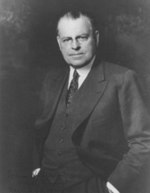Warren Austin, Date of Birth, Place of Birth, Date of Death
TweetWarren Austin
American politician
 Date of Birth: 12-Nov-1877
Date of Birth: 12-Nov-1877
 Place of Birth: Highgate, Vermont, United States
Place of Birth: Highgate, Vermont, United States
Date of Death: 25-Dec-1962
Profession: judge, lawyer, politician, diplomat
Nationality: United States
Zodiac Sign: Scorpio 
About Warren Austin
- Warren Robinson Austin (November 12, 1877 – December 25, 1962) was an American politician and diplomat who served as United States Senator from Vermont and U.S.
- Ambassador to the United Nations. A native of Highgate Center, Vermont, Austin was educated in Highgate and Bakersfield, and also studied in Quebec to learn French.
- He graduated from the University of Vermont in 1899, studied law with his father, was admitted to the bar in 1902, and practiced in partnership with his father. Austin settled in St.
- Albans, became active in politics as a Republican, and served in several local offices, including Grand Juror, Chairman of the city Republican committee, and State's Attorney of Franklin County (1904-1906).
- In 1908, he was chairman of the state Republican convention, and he served as Mayor of St.
- Albans from 1909 to 1910.
- From 1907 to 1915, Austin was a Commissioner for the United States Court of Appeals for the Second Circuit.
- In 1917, he moved to Burlington, where he continued to practice law.
- Austin's prominence continued to grow, and he served as a University of Vermont trustee from 1914 to 1941, and an attorney practicing before the United States Court for China from 1916 to 1917.
- Austin served as a special counsel for the state of Vermont from 1925 to 1937 during the process of setting the official boundary between Vermont and New Hampshire. In 1931, Austin was elected to the U.S.
- Senate in a special election, defeating Frank C.
- Partridge, who had been appointed to fill the vacancy after the death of Frank L.
- Greene.
- From 1939 to 1942, Austin was the Senate's Assistant Minority Leader (Minority Whip).
- In 1946 he resigned to accept resident Harry S.
- Truman's appointment as U.S.
- Ambassador to the United Nations.
- He took office in January, 1947, and was the first official holder of this post.
- Austin served until January 1953, when the Eisenhower administration took office.
- He resided in Burlington during his retirement, and died there in 1962.
- Austin was buried at Lakeview Cemetery in Burlington.
Read more at Wikipedia
See Also
- Famous People's Birthdays on 12 November, United States
- Famous People's Birthdays in November, United States
- Famous judge's Birthdays on 12 November, United States
- Famous judge's Birthdays in November, United States
- Famous lawyer's Birthdays on 12 November, United States
- Famous lawyer's Birthdays in November, United States
- Famous politician's Birthdays on 12 November, United States
- Famous politician's Birthdays in November, United States
- Famous diplomat's Birthdays on 12 November, United States
- Famous diplomat's Birthdays in November, United States

